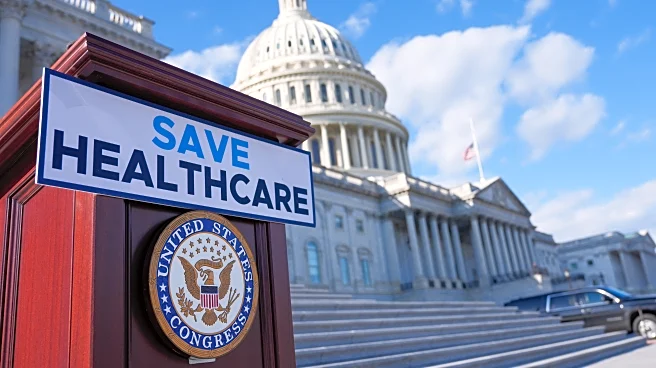What's Happening?
House Speaker Mike Johnson has kept the House of Representatives out of session during the ongoing government shutdown, which has now reached its 16th day. Johnson's strategy is to pressure the Senate
into passing the House Republicans' government funding resolution without alterations. This measure, passed in September, aims to keep the government operating temporarily at past funding levels to allow more time for negotiating year-long appropriations. However, the Senate, requiring a 60-vote majority, has rejected the resolution, with Senate Democrats demanding an extension to sunsetting health care subsidies. Despite the shutdown, House Democrats have been active in Washington, staging news conferences and protests. Johnson insists that the House will not reconvene until the Senate agrees to the House's terms, although the House Appropriations Committee continues to discuss funding legislation remotely.
Why It's Important?
The government shutdown has significant implications for various stakeholders, particularly U.S. service members who are working without pay. During the 2013 shutdown, Congress passed the Pay Our Military Act to ensure troops received their paychecks, but this time, President Trump has rerouted military funds to cover one pay period. This temporary fix highlights the financial precarity faced by military families, many of whom live paycheck to paycheck. The shutdown also affects other vulnerable programs, such as nutrition assistance for women, infants, and children, which Democrats are pushing to fund through future shutdowns. The standoff between the House and Senate underscores the political tensions and the challenges in reaching bipartisan agreements on critical funding issues.
What's Next?
The next steps involve continued negotiations between the House and Senate to resolve the funding impasse. The temporary fix for military pay only covers one pay period, creating uncertainty for the next payday. House Democrats and some Republicans are advocating for legislation to ensure troops are paid during the shutdown, with bipartisan support for such measures. Additionally, Democrats are pushing for funding bills to support other vulnerable programs. The pressure on the Senate to agree to the House's terms remains, and the outcome of these negotiations will determine the duration of the shutdown and its impact on government operations and affected groups.
Beyond the Headlines
The shutdown raises ethical and leadership questions about the responsibilities of lawmakers to their constituents during times of crisis. The decision to keep the House out of session as a strategic move to pressure the Senate reflects broader political dynamics and the use of legislative power in negotiations. The financial strain on military families and the potential disruption to essential services highlight the human impact of political decisions. The situation also underscores the importance of bipartisan cooperation in addressing national issues and the consequences of political gridlock.









